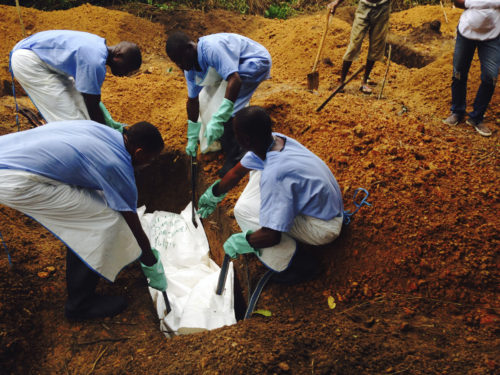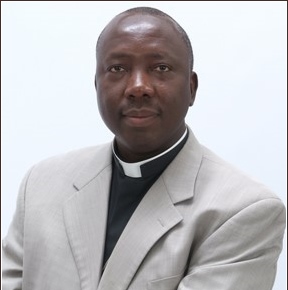Church groups mobilize to address West Africa Ebola outbreakPosted Aug 14, 2014 |
|

Volunteers lower a corpse, which is prepared with safe burial practices to ensure it does not pose a health risk to others and stop the chain of person-to-person transmission of Ebola, into a grave in Kailahun, Sierra Leone. Photo: Reuters/WHO/Tarik Jasarevic
[Episcopal News Service] Two Episcopal Church priests with deep personal and professional roots in two of the countries being devastated by Ebola say that efforts to stem the deadly virus’ spread are being hampered by a slow response, lack of medical supplies, illiteracy, poverty and misinformation.
“The problem we have had is Liberians not taking preventive measures,” the Rev. James Tetegba Yarsiah told ENS Aug. 13, adding that up to a few weeks ago many Liberians were not paying attention to this “deadly disease.”
“It is now that they are getting very serious about it,” said Yarsiah, who is the chaplain and vicar at Voorhees College where he is also an assistant professor of religion and philosophy. He also is a leader in the Liberian Episcopal Community in the United States of America.
Yarsiah’s parents, siblings and mother-in-law plus other relatives and friends live in Liberia, which along with Sierra Leone and Guinea is at the heart of the worst outbreak of Ebola in history. He has been urging them to take preventive measures to protect themselves against the virus, he said.
They are “being very terrified and horrified by the way [Ebola] has ravaged and killed people in West Africa, so they are coming to the realization that this is very dangerous.”
“And they also see the suffering that it has brought upon the land,” he said.
Up until very recently, the Episcopal Church of Liberia, which has its roots in the U.S.-based Episcopal Church and is now a part of the Anglican Church of the Province of West Africa, has not been doing much about Ebola, Yarsiah said.
“And the reason for that is this is something that has caught the entire country unexpectedly, and has moved so quickly and has caused so much havoc and death,” he explained, adding that the Episcopal Church in Liberia does not have the needed materials, facilities and medical supplies that are needed. The church, however, is trying to educate people, especially in rural areas, about how to protect themselves.
Archbishop Jonathan Bau-Bau Bonaparte Hart, who was elected in 2008 as the bishop of Liberia and became the archbishop of the Internal Province of West Africa in the Church of the Province of West Africa last month, told Yarsiah of the suffering and fear he sees in Liberia.
“He is fearful for his parishioners throughout the diocese,” Yarsiah said.
Ministering to an area affected by such a disease as Ebola is, Yarsiah said, “a burden on him and all the clergy and all the church.”
He said he has heard from fellow graduates of Cuttington University, founded in 1889 in southern Liberia by the U.S.-based Episcopal Church, who have lost family members to the virus. Some professional nurses who were Cuttington graduates have died, Yarsiah said.
That sort of news brings Ebola “close to home” for those living in the United States, he said. It makes people worry that they will soon hear bad news about their loved ones back home.
Yarsiah believes that while many Episcopal churches in Liberia are being touched by Ebola, most are still functioning. “This is a time that churches need to open their doors and help education people, help comfort and counsel people,” he said.
In an Aug. 8 call for prayers for the people of West Africa the Anglican mission organization Us., formerly known as USPG (United Society for the Propagation of the Gospel), reported that Hart had told its staffers “we have joined hands with the council of churches, the government and other organizations in the fight against Ebola. Churches are educating our members to avoid contact with infected people, wash hands with chlorine, and not to panic.”
“We encourage the public to keep their environments clean,” Hart said, adding that the church is repeating the message of the health authorities in calling on Episcopalians also to “avoid hand shaking and, as much as possible, refuse unnecessary bodily contact.”
“We need disposable surgical gloves, chorine and basic hygiene kits to safeguard against Ebola,” Hart told Us.
Yarsiah said that the Liberian Episcopal Community in the United States of America is trying to help the church gather those supplies, using a list provided by the Liberian Council of Churches, of which Hart is the president, and another list posted on the website of the Liberian embassy in Washington, D.C.
More information about that effort is available on the organization’s website.
In late July, the Liberian Council of Churches called for three days of national “indoor fasting and prayer” Aug. 6-8. The call, which was reported in Liberian newspapers, began by saying that “God is angry with Liberia, and that Ebola is a plague. Liberians have to pray and seek God’s forgiveness over the corruption and immoral acts (such as homosexualism, etc.) that continue to penetrate our society. As Christians, we must repent and seek God’s forgiveness.”
Ebola in Sierra Leone
In the Diocese of Texas, the Rev. Johannes George, a native of Sierra Leone, said he is hearing other kinds of misinformation about Ebola.
George has been in contact with friends and family daily for updates. Along with his congregation at Christ the King Episcopal Church in Houston, George has gathered a larger group of Africans in southwest Houston, to pray and raise money to help, the diocese reported Aug. 12. He also meets online each Saturday with Muslims and Christians across the country to pray for victims and health workers in Africa.
George said he has talked to people in his home town of Kenama, which is under quarantine.
“Nobody trusts anyone. They don’t trust the health workers; you don’t even trust your own family,” George said during the Diocese of Texas video interview.
“There is a conflict between the health workers and the traditional people,” he said, growing out of the people’s tradition of washing and anointing the dead and “giving them the final hug” before burial and medical workers’ efforts to keep people of having such contact with those whom Ebola has killed.
People, he said, need to be sensitized to the fact that they must behave differently during an epidemic. That fact is lost on some people, especially in rural villages, George said.
“They don’t believe that this is something coming from within,” he said. “The belief is that this is coming from the outside, coming from the West and that the West is infecting them with this.”
They do not understand that Ebola comes from eating monkey, insects and other “bush animals,” which George said the people eat for lack of other food. Disseminating information about Ebola and how it is spread is difficult because so many people are illiterate. Most do not have working radios or televisions, he added.
A New York Times’ story recently painted a grim picture of the virus’s spread in Njala Ngiema, where George once served and preached. The village of 500 has lost more than 10 percent of its population, many of whom are subsistence farmers.
George is worried that quarantines imposed to halt the spread of the disease will hurt the poverty-stricken population by cutting off what little food and water supplies villagers have. They will resort to drinking from polluted streams and eating more bush meat, he said.
The Times has reported that experts acknowledge that any cordon must let food, water and medical care reach those inside.
Ade Renner-Thomas, chancellor for the Diocese of Freetown, Sierra Leone, told Us. on Aug. 8 the Sierra Leone government has declared a state of public health emergency, which means there are quarantines in the areas most affected. Movements are restricted in certain areas, and gatherings of more than five people are prohibited.
“When we have met as a church, there are no more handshakes when we share the peace, etc.,” he told Us. “We need as much prayer as you can offer.”
Episcopal Relief & Development is working with its partners in both Liberia and Sierra Leone supporting awareness-raising efforts and providing personal protection equipment and disinfectants to under-resourced hospitals and clinics in the affected areas, according to an Aug. 6 press release.
The breadth of the outbreak
The current Ebola outbreak began in Guinea in December 2013 and now involves Guinea, Liberia, Nigeria and Sierra Leone, according to a statement from the United Nations’ World Health Organization.
On Aug. 14, WHO said there were 1,975 cases of Ebola and 1,069 deaths reported in Guinea, Liberia, Nigeria and Sierra Leone.
WHO has called the outbreak “the largest, most severe and most complex” since the disease was first seen in Zaire, now the Democratic Republic of Congo, in 1976. The disease killed 280 during that outbreak, according to the United States Centers for Disease Control and Prevention.
In his interview with the Diocese of Texas, George called for experimental drugs to be made available immediately. And on Aug. 13, the World Health Organization endorsed such use, with caveats.
The endorsement came after the organization convened a group of ethicists to consider the implications of responding to calls to use such drugs to try to save the lives of patients and to curb the epidemic even though they have not been evaluated for safety and efficacy in human beings.
“There was unanimous agreement among the experts that in the special circumstances of this Ebola outbreak it is ethical to offer unregistered interventions as potential treatments or prevention,” Marie-Paule Kieny, the World Health Organization’s assistant director general, said.
If and when the drugs are used to treat patients, “there is a moral obligation to collect and share all data generated,” the group said in an Aug. 12 summary of its discussion the previous day.
“There was unanimous agreement that there is a moral duty to also evaluate these interventions (for treatment or prevention) in the best possible clinical trials under the circumstances in order to definitively prove their safety and efficacy or provide evidence to stop their utilization,” the group said.
— The Rev. Mary Frances Schjonberg is an editor/reporter for the Episcopal News Service.


Social Menu